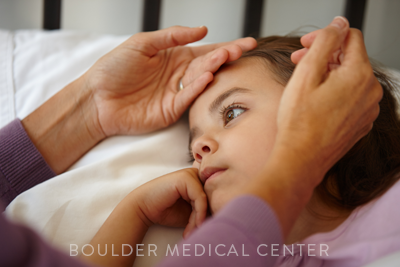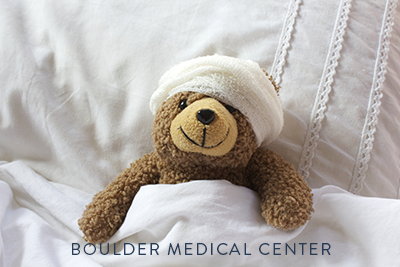by Dr. Lauren Brave
Pediatric Specialist
Boulder Medical Center
 As we head back into the colder months, often referred to as cold and flu season, some of our pediatric patients are already exhibiting symptoms of viral illnesses. In turn, we are also hearing from parents who are experiencing the stress of caring for their sick child. Parents can feel frightened and powerless as they watch their child struggle with these illnesses, perhaps not knowing whether or not to seek medical attention.
As we head back into the colder months, often referred to as cold and flu season, some of our pediatric patients are already exhibiting symptoms of viral illnesses. In turn, we are also hearing from parents who are experiencing the stress of caring for their sick child. Parents can feel frightened and powerless as they watch their child struggle with these illnesses, perhaps not knowing whether or not to seek medical attention.
The purpose of this pre-season primer is to help you identify when to monitor your child’s illness at home and when you should bring your child to the doctor.
PLEASE NOTE: I’m writing this article with immunized children, older than three months old, in mind. For any illness in newborns or if your child is unimmunized, call your doctor.
This article focuses on illnesses, such as the common cold and flu, that are caused by viruses. Here are the most common examples:
The Common Cold
The most prevalent condition that our pediatric clinics see during the colder season is aptly named the “common cold.” Typically, the symptoms are fatigue, sore throat and fever. These symptoms generally evolve to runny nose, congestion and cough. We usually do not test for viruses that cause a cold.
Colds are contagious via respiratory secretions (mucous and saliva) from an infected person entering the respiratory tract. The best way to protect yourself from viruses is to wash or sanitize your hands frequently, especially after you’ve been in public. Also, avoid touching your eyes, nose and mouth. As you know, it is almost impossible for young children to follow these prevention guidelines, so they will most certainly develop colds — and give them to you!
Symptoms are usually worst in the first two to three days and will typically start to improve by the fourth day. It can take one to two weeks for symptoms to abate, which is fine, as long as you’re seeing a noticeable improvement daily.
The mainstay of treatment for the common cold in children is clearing nasal passages with nasal saline and either suctioning with a bulb/Frida or blowing the nose. A cool mist humidifier can also help. Acetaminophen or Ibuprofen for children six months and older can be administered for fever or discomfort. Administering honey can also help suppress coughs — only for children 12 months and older.
We Recommend that You See Your Doctor When:
- Fever over 100.5°F is present for three days or more
- Breathing is labored (see Bronchiolitis section below for signs of labored breathing)
- Urination has decreased to less than every eight hours
- Symptoms are not improving by 7-10 days
Helpful Tip:
- Refer to the Pediatrics Acetaminophen & Ibuprofen Dosing Chart on our Pediatrics Department Web Page
Croup
Croup is most often caused by the parainfluenza virus. We usually see parainfluenza in the fall, but there can be small outbreaks of croup throughout the year. Croup typically affects children between the ages of six months and three years old, but of course, slightly younger or older children may also be affected.
Croup is an upper airway illness. This means that the lungs are typically clear and the issue is in the upper windpipe. The windpipes of children are shaped like a funnel (adult windpipes are a cylinder). Croup causes swelling at the bottom of the funnel, creating a much smaller breathing space. This is why kids with croup sometimes have difficulty breathing.
The hallmark characteristic of croup is the seal bark cough, which always seems to worsen at night. At the end of the barky cough, you may hear a high pitched noise as your child breathes back in. This is called stridor. Other symptoms include sore throat, hoarse voice, runny nose and fever. Symptoms are typically worst in the first two to three days then start to improve. If you suspect croup, the best initial intervention is humidity. Steam up a bathroom for children who are having coughing fits. Use a cool mist humidifier in their bedroom. Ibuprofen is helpful for children over six months old who are experiencing a painful throat or fever.
Seek Medical Attention if you are Worried or if:
- Your child is not breathing — call 911
- You are hearing stridor that it is not responding to steam and the humidifier within 10-15 minutes
- You can drive to your nearest emergency facility as further treatment, as steroids or inhaled epinephrine may be necessary
Bronchiolitis
Contrary to croup, bronchiolitis is a viral infection of the lower airways, i.e. the lungs. The most common virus that causes this condition is called Respiratory Syncytial Virus, or RSV. Generally, we start to see RSV around December and continuing through March or April, although each every year is slightly different. RSV can infect anybody; it gives adults colds and causes bronchiolitis in children up to about two years old. Unfortunately, RSV immunity wanes over time so you can become infected again.
Symptoms of RSV generally begin like the common cold. Runny nose, sore throat, fever, and cough are present in the first few days. The major distinction with RSV is the quantity of secretions — with RSV, there are a lot of secretions. The other distinction is that while symptoms start to improve after two to three days with the common cold, RSV generally will start to get worse at this time, lthough, depending on the child, symptoms can start off poorly as well.
There is no treatment for RSV other than supportive measures such as nasal saline and suctioning. About one percent of children will be hospitalized for RSV because their oxygen levels drop and they require supplemental oxygen and copious suctioning. Considering that almost everybody gets RSV, this means that many kids are hospitalized each year!
Seek Medical Attention if you are Worried or if you Observe:
- Labored Breathing. This is the most important thing to watch for
- Signs of respiratory distress in infants and toddlers — retractions when breathing, nasal flaring, abdominal breathing, and a rapid breathing rate. Retractions look like the skin is sucking in around the ribs, collarbones and sternum. Abdominal breathing looks like a bounding belly. Respiratory rates approaching 40 to 50 breaths per minute are starting to get too high. Babies and children in respiratory distress also will not be interested in eating and may have trouble staying hydrated
- Fever over 100.5°F for three days or more
Influenza
Last but not least, it’s not called flu season for nothing! Influenza is a prolonged virus that we generally see from late November through April, although every year is slightly different. The influenza is a wily virus that alters itself every year in order to evade your immune defenses. This means that getting the flu once doesn’t protect you from getting it again.
Anyone can be affected by the flu virus. Persons who are very young and very old, however, are more likely to be hospitalized with complications. Those with a chronic disease that may compromise their immune system, such as asthma, are also at a higher risk.
Symptoms generally start as all of the previously mentioned viral illnesses do. The hallmark of influenza in addition to fever, sore throat, congestion and cough are extreme fatigue, body aches, and a longer duration of symptoms. Fever can typically last for four to five days. We have a rapid test for influenza at our Boulder Medical Center clinic. If you are suspicious of influenza and symptoms have started within the last 48 hours, we can perform a test and, if positive, prescribe a medication called Tamiflu. This is not exactly like an antibiotic but reduces how contagious a person is and decreases the duration of symptoms.
The strongest defense against flu is the influenza vaccine. Many people are hesitant to get it since there is a small chance that a child will get the flu, even with the vaccine. We never know how effective a given vaccine will be until the flu season is well underway. Even so, the best device we have in our toolbox to combat any epidemic is widespread vaccination. Therefore, we strongly encourage everyone to get their vaccines; this helps protect our young and elderly! Also, even a poorly matched vaccine is likely to give you some protection (i.e. if you get sick, you might not be quite as sick).
Seek Medical Attention if you are Worried or if:
- Your child has a fever of over 100.5°F for three days or more
- Breathing is labored in any way
- Urination has decreased to less than every 8 hours
- Symptoms are not improving at all by 7 days
About Over-the-Counter Medications
Remember these tips regarding over-the-counter medications:
- Over-the-counter cough syrups, decongestants, and expectorants are not recommended for children under age six. There can be undesired side effects such as extreme sedation, and studies have proven that these medications just do not work as claimed in young children. These medications don’t work very well in older children either
- Acetaminophen and Ibuprofen can be used safely for fever and/or pain when appropriate doses are given (go to the Pediatrics page for the dosing guide)
- Aspirin is NEVER recommended for children under 18 years old
- Good, old-fashioned Vicks Vaporub has been shown to benefit children over age two. Even though I cannot explain it, parents the world over say that rubbing Baby Vicks on the bottom of their infant’s feet and covering with socks helps reduce couging at night
- Honey has been shown to suppress coughs but can only be used in children 12 months and older
Conclusion
I hope this has given you some helpful information to navigate the complicated world of children’s viral illness. Please always remember that the Boulder Medical Center pediatric department is here to help. Our four clinic locations in Boulder, Longmont, Louisville and Broomfield are closeby with care for newborns through the teen years. For more information:
- Boulder Medical Center pediatric department page
- Dr. Lauren Brave’s clinic at BMC-Foothills or BMC-Longmont: (303) 938-4750
About Dr. Lauren Brave
 Dr. Brave practices in all areas of general pediatrics at Boulder Medical Center including care of newborns through teens, preventive medicine and well-care, sick care and acute injuries, and more.
Dr. Brave practices in all areas of general pediatrics at Boulder Medical Center including care of newborns through teens, preventive medicine and well-care, sick care and acute injuries, and more.
Her clinics are located at Boulder Medical Center in Boulder and Longmont.
To learn more about Dr. Brave, visit her profile.

